Traveling without money in developing countries – is it ethically right?
What does it mean to travel with no money in Africa?
I always say, traveling is for free. The only thing that costs money is hotels and restaurants. On my trip hitchhiking one year through Asia I experienced that the less developed a country is, and therefore the poorer the people are, usually the more hospitable they are.
But should we rely on hospitality and generosity while traveling? Should we travel with no money in third world countries, not being able to cover our own costs?
That’s the big questions going through my head while traveling without money in Africa – more or less without money. 😉
How much money do you really need when travelling in Africa?
Before I set off for my trip to Africa, people told me: “The only thing I really need to pay for on my trip hitchhiking through Africa is the visas. Everything else will be covered.” I couldn’t believe them. Not until I experienced it myself.
Of course for tourists most countries in Sub-Saharan Africa are everything else than cheap travel destinations. If you visit other budget travel websites, you’ll see that they recommend a budget of 50 USD a day for travelling in Senegal for example.
But if you get away from the big cities and the tourist destinations and travel off the beaten path in Africa, you quickly get overwhelmed by the hospitality of the open-hearted people inviting you to their homes, sharing their food with you and treating you like a member of their family. At least that’s what I felt like travelling in Senegal.
As soon as I started living not only with the locals, but also like a local, I was able to live from less than a Euro per day (except when I was sick and needed a doctor). And all that while getting to know the local culture of Senegal.
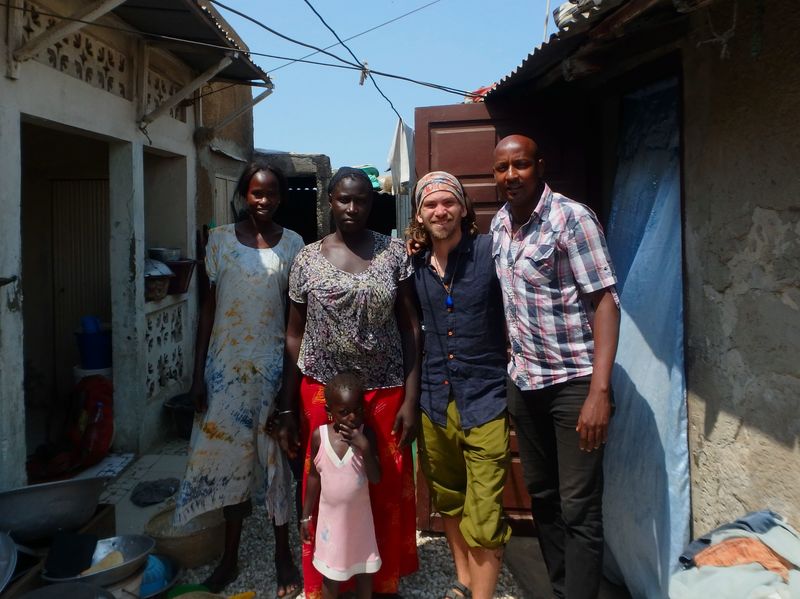
Staying with a lovely family in Fadiouth
So should we rely on the hospitality of the people?
When I was in Spain, I met a guy who was traveling without money in Africa, he went from Portugal to Guinea-Bissau with no money at all. So yes, it is possible to travel without any money at all. Especially in these countries, where the people give so much.
But this means you not only have to rely on the helpfulness of the people, you are also fully dependent on them. There is nothing you can treat yourself with. No coffee when you need one, no juicy mango and no hostel bed when you are tired of staying with people.
I for myself, I want to be able to come up for my expenses while travelling all by myself. Of course I don’t need much. I know I can sleep everywhere in the world for free without getting invited.
But I want to have the possibility to buy myself a sandwich when I’m hungry or some fruits when I feel so.
Also I don’t expect getting invited by locals. But if it happens, and it happens a lot over here, I am very thankful and appreciate it very much. I don’t have a lot of money that I can give, but I always try to cover my own costs – and a little more. Anyway, I always feel bad with giving money, so I prefer to go to the market, buy some vegetables or help with the shopping, or buy some new clothes for their kids.
Besides that there are many other ways to give back while travelling without money.
But the best I have to share is my endless happiness and the smiles, I’m infecting others with. Maybe that’s also why I get invited so often.
Since I set foot on Africa I’m constantly being asked for money. And I think, I can’t give money to everyone, but I can give everyone a smile coming from the bottom of my heart.
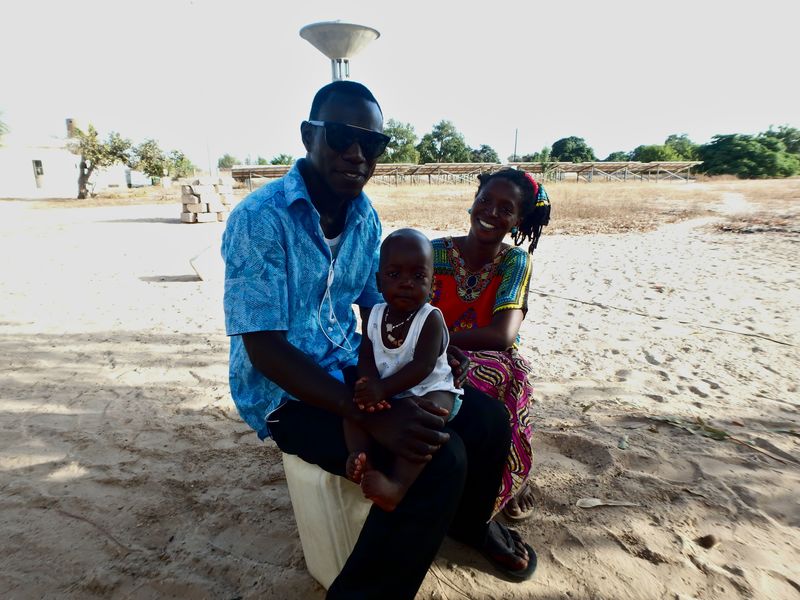
Friends in Bassoul, a lovely fishing village in the Sine-Saloum river delta
Teranga
Teranga, the Senegalese word that describes the best how fabulous I got treated during my last weeks here in Senegal. The Wolof word Teranga would translate to hospitality, but Teranga is much more than that for the Senegalese people. It’s a core value in Senegal how others get treated. With much respect, compassion and an inviting hand.
Just like in Mauretania the Senegalese people drink green tea (with loads of sugar of course) several times a day. And they will always invite others to drink the tea with them. I always try to explain them that it’s not tea what they are drinking, but sugar-water with tea flavour. 😀
There is another Wolof word, that they use when taking the tea.
Nokoboko – it means, we take it together.
And that goes not only for the tea, but also for the food. They say, no one should have to eat alone. Food is alway taken together. So when a meal is taken, the big plate is being put on the floor and the whole family will gather around and share the meal. Some might use a spoon, some eat with the fingers.
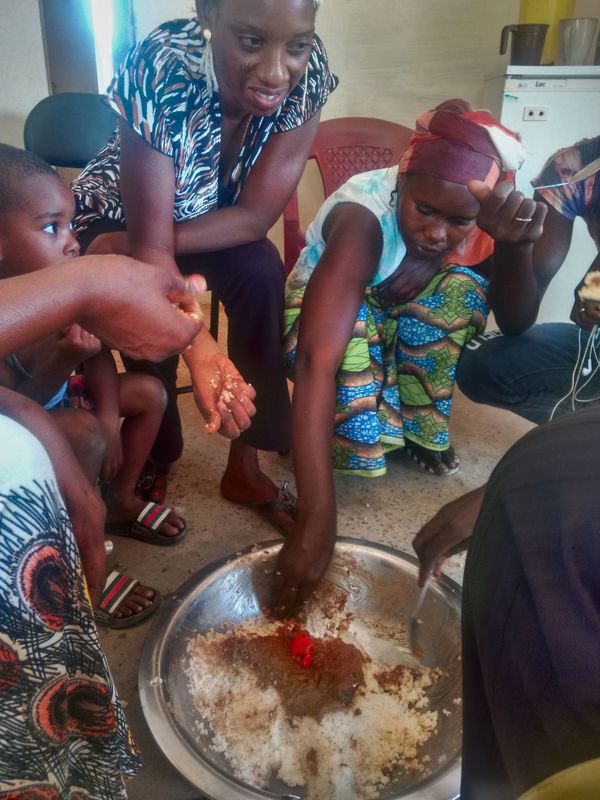
Sharing the meal in Senegal
Hitchhiking in Senegal
While I was back home in Austria, preparing myself for my trip hitchhiking through Africa (mostly mentally), I was wondering if hitchhiking will work in Africa. I thought people will see me as a white man, who obviously must have money, since I’m travelling in their country far away from home, and therefore I don’t need a ride. The first part may be the case.
Especially if I tell people, I’m travelling around Africa for one or two years, the typical reaction is “Wow! You must have so much money!”. And yes, I must have by far more money on my bank account than most of the people I come across over here.
But still hitchhiking in Senegal is so easy and fun!
As soon as I realised that the worst looking cars, the driving wrecks are taxis and took care to not wave them down, the fun began.
I hitchhiked with truck drivers, scientists, foreign residents, scooters, school ‘buses’, on the roof of a bus, and as a load inside a construction site truck.
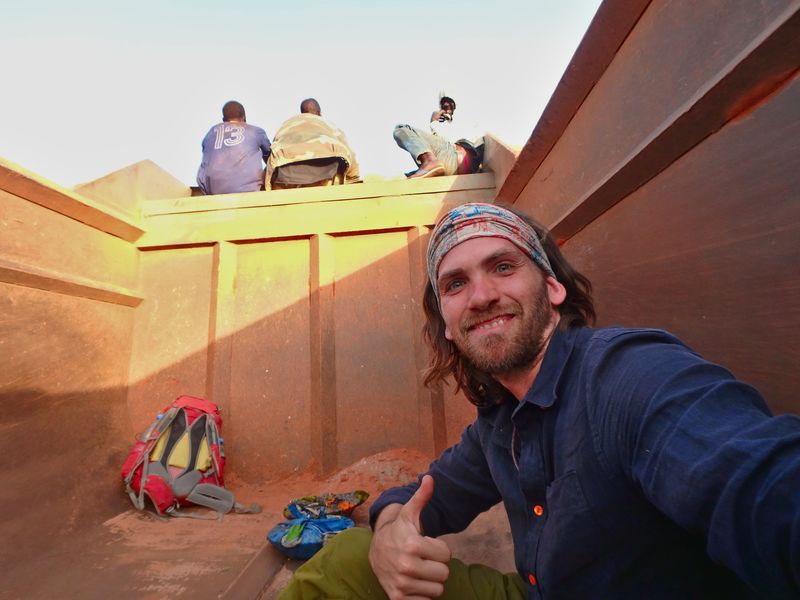
Inside a truck in Senegal
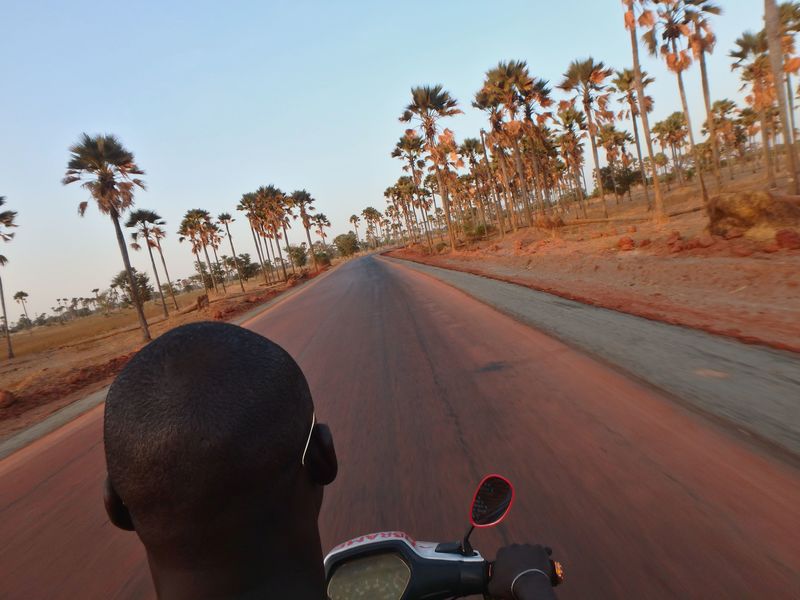
Hitchhiking with a scooter in Senegal
A heart-touching hitchhiking experience
The best though was when I hitchhiked from Mbour to Joal-Fadiouth and a big estate car stopped for me. The driver asked for 500,- CFA and I told him that I don’t have any money. He was so kind to take me anyway and opened the back door for me to climb in. When I got in I realised that it’s a school bus full of high school students in their uniform. And as soon as I sat down in the car boot, one of the students passed me a few coins. Of course I kindly declined. But this experience deeply touched my heart!
Imagine this happening in Europe. A black man stops a school bus and the driver gives him a free ride after the black man says he has no money. And then one of the students offers him money. Never!
Is it right to say, I have no money when I actually mean I don’t want to pay for it? All students are paying for the bus, but I’m not. Of course, the idea of hitchhiking is that if someone is going your way and has a free seat, he can take you anyway and you both have a good experience getting to know each other. But in Africa a seat in a car never stays empty and you take the seat, somebody else would pay for.
My final conclusion
In the end I think people in Senegal work very hard to earn very little (the average salary lies around 50€ per month). And you should be at least able to cover your own costs. Anyway, it depends very much on the situation and with a profound understanding of human nature you can tell if an offer comes from the heart or is because people feel obliged.
For sure I’m very thankful for the great time I experienced, staying with families in Senegal! To get to know a tiny bit of their world and to share a little bit of mine with them.
And anyway…
The more you give, the more you got to give!

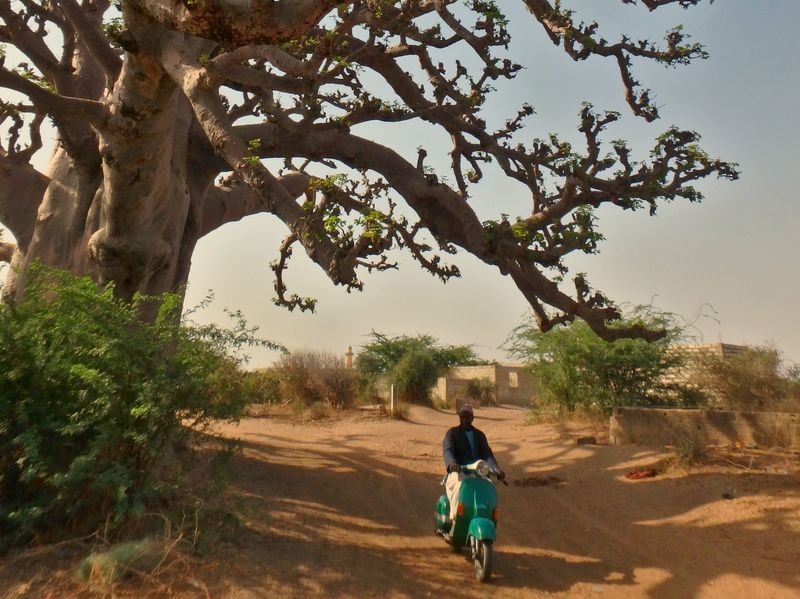

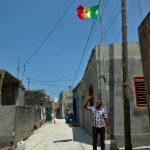


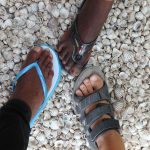



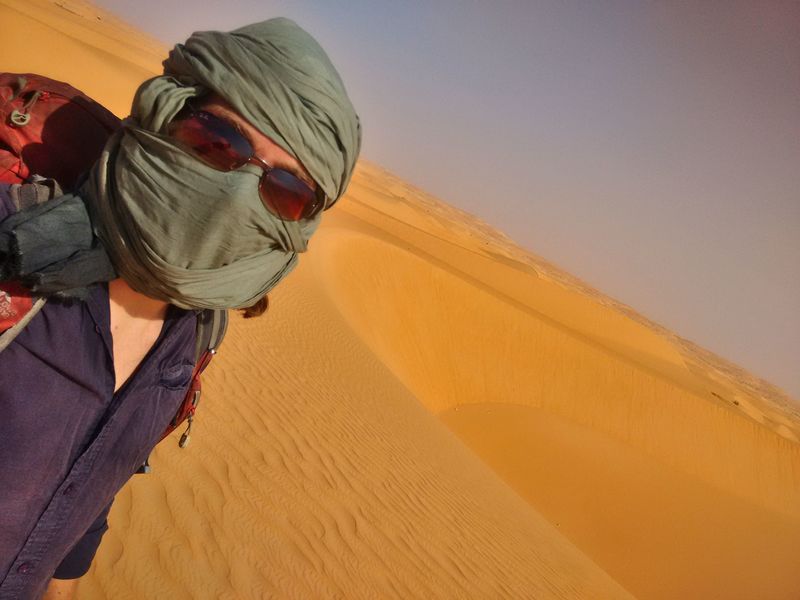


 Join my adventure!
Join my adventure!




Found your thoughts very captivating just days before my own travel without money starts 😀
Very nice article. For the question you have asked – In my opinion if you are not totally broke and have nothing you should atleast give back as much as you are taking from a poor hospitable family. May be a days grocery or a book for the kid at home or a utensil that you see has broken..just anything. Just taking free rides and food and place to sleep for your won experience and not paying anything for it is not morally right. If a poor gives to you his good karma increases but your debt in karma account increases. Don’t want to put philosophy into it but think about it. When I was in Uganda as a volunteer I saw..literally saw how hospitable the people are. with nothing in their house and plain water boiling on their stove the guy without hesitation cut of his plantain bunch and gave it to me along with biscuits and cola etc. I am just saying that these people can really give a lot but we comparatively wealthier ones should be the ones giving and not just taking. Anything..a little but give. doesn’t have to be cash or lots of money. What I did for some women groups was just gave a little like may be 10-15 euros for them to buy dried fish and bananas etc to start their won business which they could keep running with the profits. It was so little but they couldnt have saved that much to start business for years may be. You are thoughtful and thought about this thing..I like it 🙂
Yeah, that’s exactly what I’m thinking. You should at least give as much as you are taking and cover your own costs. On the other hand I’m a big fan of pay it forward. So when I think it’s also totally fair to accept an honest invitation from wealthier people and pay it forward to people to who don’t have so much.
I did quite a lot of moneyless traveling when i actually had a back up and never even thought about it, it was just a fun adventure, now i realize i should have shared more till i was penniless, i,m looking forward to do it.
Absolutely love your stories, your thoughts and the way how you share your experience. You’re one of the wayfarers, pathfinders, trailblazers . . who encourage and strengthen others (like me) to start living their potential, their dreams. Additionally to a meal or a small gift you give a lot – things that money can’t buy, things that will last. Like lovely memories of the day when we met in the desert. 🙂
Good luck and keep riding high, g.
Yeah, the thing to understand with all of this is that people in developing countries, especially Africans, do not generally tend to store money. When money comes in they spend it very quickly and the concept of saving for the future has never really clicked with the 90% majority. So, this means that it’s very common to meet people who genuinely have zero money in their pockets, in fact it’s the norm most of the time. Africans are usually telling the truth when they appeal to you, saying they have no money to buy food. It doesn’t mean that we should give them money (in my opinion) because that just encourages them to be irresponsible with the little money they do have, and it doesn’t encourage them to think of their future and save money for tomorrow’s meal… but my point is that they are used to meeting people who claim they have no money, and therefore they are used to sharing what they have.
So when they meet a white guy who claims he/she has no money (especially if you look like a bit of a hippie vagabond!), usually they will assume you are genuinely broke… and then they will take pity on you – the poor traveller, far from home, lost all his money… They know that theft is rife and how easy it is to lose everything you own… It’s not difficult for them to imagine your situation and sympathise, the way others have always sympathised with them and given them food when they were hungry.
Also, another factor is that white people have a strong reputation for being trustworthy and not lying/deceiving/tricking others. We tend to have more integrity and so people in developing countries will readily believe you if you say you have no money. But if they find out that, in fact, you have an ATM card and a bank account with at least 3, 4 or 5 figures in it… they will be quite shocked that you are such a tightass that you refuse to pay your own way.
As I said, Africans (usually) can’t really understand the concept of saving. For them, if you have money in your pocket (or in the bank), even if it’s your last 100 dollars, then you have money to pay for your needs… and therefore you should. Otherwise it’s simply abusing charity and generosity…
Yes, Africa CAN afford to feed another hungry mouth. Yes, they always will stretch their resources to help people in need. Yes, they can and they will… but not only are we making the poorest continent poorer if we do that, we are also encouraging begging and deception, which in my opinion are the biggest problems with the modernising Africa.
I’m glad to see you have reached the same conclusion. 🙂 Safe travels.
i will have a read, having walked a bit of Africa, a long time ago now, I wonder what has changed.
the key words i see you use are
“Is it right to say, I have no money when I actually mean I don’t want to pay for it?”
what is money? – just a token of exchange for goods and services.
so what else can “you” (the reader) use to exchange? or do “you” expect life for nothing?
yes i say it is unethical to travel with out money. as nowhere in many of these articles today do they define what money is or how it can or how they see how it should be used.
a few are now saying, “I have no cash in my pocket today”.
But i now see so much expectation of “I really just do not want to pay for it”.
and I have been there. I have felt that. and I have done that.
But I also have bought food for the family. paid towards their bills. used work/help as my token of exchange for goods and services. and have been lucky to wonder around this little world a few more times than most of the readers here.
it is all about your attitude.
and yes, “the more one gives the more one has to give”
Really great to hear from you Stevie, and to find that your African experiences are interesting and enlightening. Sorry I have not been in touch much lately – too much out in the bush for the Internet just now
Great post, Stevie!
I also used to hitchhike in Africa… Kenya, to be more accurate. It looks so familiar, however!
Greatness is always in small things.
Either you appreciate them or you end up with nothing. That is how the things work everywhere.